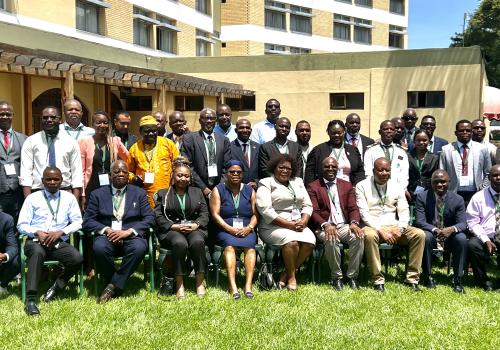The Southern African Development Community (SADC) region is actively working towards promoting and advancing the growth of the regional leather value chain, which is among the 32 priority value chains in the region. The leather value chain aligns to the regional strategic objectives which seeks to advance industrialisation and regional integration through the agricultural and natural resource led economic growth. The SADC region is home to over 300 million herds of cattle, sheep, and goats, combined. Malawi on the other hand is home to over a 10th of the region’s goat population and continues to register a steady growth in the population of cattle, which as of 2022 had an estimated 2.2 million herds, from 1.8 million in 2019.
As part of the implementation of the Support to Industrialisation and Productive Sectors Programme (SIPS), the SADC Secretariat, in partnership with the Ministry of Trade and Industry of the Republic of Malawi, hosted a 2-day strategic workshop on 12-13 March 2024 in Blantyre, Malawi to develop a national Strategic Workplan as part of the domestication of the Regional Leather Value Chain Model Policy Framework. The Workshop brought together key stakeholders from the public and private sectors of the leather industry in the country, who deliberated on key policy and regulatory gaps as well as devise best practices in resolving the key bottlenecks to the development of the local leather value chain.
Delivering the keynote address on behalf of the Permanent Secretary of the Ministry of Trade and Industry, Ms. Gladys Chimpokosera, Deputy Director of Industry in the Ministry of Trade and Industry for Malawi, emphasised that the workshop is aligned with the specific objectives outlined in Malawi's Vision 2063. The Vision places impetus on industrialisation through promotion of research, science, technology and innovation as well as education and skills development to promote product development and design.
She highlighted the tremendous significance of the leather sector for economic development of Malawi, not only as a valuable commodity but also as a custodian of tradition, culture, craftsmanship, and the overall rich heritage.
Ms. Chimpokosera acknowledged the efforts made by stakeholders to enhance capacity and contribute productively to the sector, stating that these endeavours position leather products as lucrative opportunities for entrepreneurs, not only in Malawi but also in the region. She also highlighted the challenges faced by the sector, such as the lack of innovation and the technological hurdles that hinder the production of high-quality products.
As outlined in the SADC Industrialization Strategy and Roadmap (SISR) 2015-2063, which aims to promote industrialisation, enhance competitiveness, and deepen regional integration through increased manufactured goods and exports, Ms. Chimpokosera urged the region to refocus its education system on modern knowledge economies, particularly technical and vocational skills. She noted that this will enable the leather industry to respond to current and future skills needs and ensure continuous training programmes that enhance investment efficiency and global competitiveness.
In his welcoming remarks, Mr. Calicious Tutalife, Senior Programme Officer for Value Chains at the SADC Secretariat expressed his appreciation to the Government of Malawi, along with other SADC Member States such as the Democratic Republic of Congo (DRC), Namibia, Mozambique, Zambia, and Zimbabwe, for their interest in domesticating the SADC Regional Leather Value Chain Model Policy.
He highlighted that the purpose of domesticating the policy was to align the document with national instruments, particularly those relevant to the national leather industry. This in turn would ensure complementarity between regional and national interests and that the regional model policy should be relevant to each Member State. He therefore urged and emphasised the need for stakeholders to have an open discussion on the operations of the Malawian leather industry and fully participate in developing a national Strategic Workplan that would strengthen and grow the national leather value chain to the benefit of Malawi and the region.
The workshop was made possible through a financing agreement signed between the SADC Secretariat and the European Union (EU) in 2019, under the 11th European Development Fund (EDF) to the tune of €18 million.

